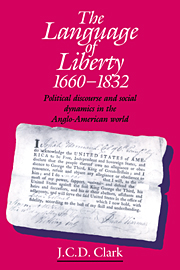 The Language of Liberty 1660–1832
The Language of Liberty 1660–1832 Published online by Cambridge University Press: 29 December 2009
LAW, NATIONALITY AND NATIONALISM: MONARCHICAL ALLEGIANCE AND IDENTITY
Whatever the causes of the successive breakdowns in governments on both sides of the Atlantic between 1660 and 1832 examined in this book, it is important to establish from the outset that nationalism was not among them; and the evidence for this hypothesis throws much light on those real causes which will be discussed below. Early-modern societies sustained a variety of forms of collective self-consciousness, but these turned only to a small degree on the later preoccupations of ethnicity and language; here as elsewhere, a new term in the early nineteenth century accompanied a new phenomenon. Nationalism was a mentality which postdated, and (it will be argued) necessarily postdated, the profound redefinitions compelled by the events of 1776 and 1789. Its histories appropriately begin with the French Revolution and the Romantic reaction to it, less appropriately finding in early-modern states only ‘protonationalism’: ‘roots’ or obscurely-expressed ‘origins’ of what is wrongly assumed to be a single phenomenon, that nationalism which came to ‘maturity’ in the nineteenth century.
National identity in the ‘old society’ was indeed a very different matter from its later forms, and the early phenomena were in no strong sense the ‘origins’ of the later ones.
To save this book to your Kindle, first ensure no-reply@cambridge.org is added to your Approved Personal Document E-mail List under your Personal Document Settings on the Manage Your Content and Devices page of your Amazon account. Then enter the ‘name’ part of your Kindle email address below. Find out more about saving to your Kindle.
Note you can select to save to either the @free.kindle.com or @kindle.com variations. ‘@free.kindle.com’ emails are free but can only be saved to your device when it is connected to wi-fi. ‘@kindle.com’ emails can be delivered even when you are not connected to wi-fi, but note that service fees apply.
Find out more about the Kindle Personal Document Service.
To save content items to your account, please confirm that you agree to abide by our usage policies. If this is the first time you use this feature, you will be asked to authorise Cambridge Core to connect with your account. Find out more about saving content to Dropbox.
To save content items to your account, please confirm that you agree to abide by our usage policies. If this is the first time you use this feature, you will be asked to authorise Cambridge Core to connect with your account. Find out more about saving content to Google Drive.